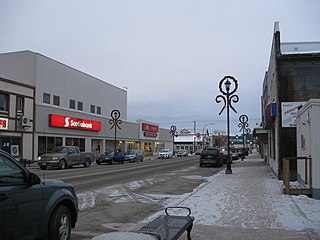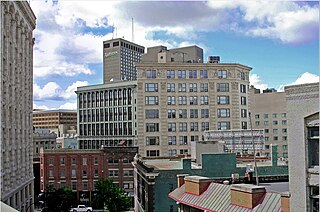
Flin Flon is a mining city, located on a correction line on the border of the Canadian provinces of Manitoba and Saskatchewan, with the majority of the city located within Manitoba. Residents thus travel southwest into Saskatchewan, and northeast into Manitoba. The city is incorporated in and is jointly administered by both provinces.

The University of Winnipeg is a public research university in Winnipeg, Manitoba, Canada. It offers undergraduate programs in art, business, economics, education, science and applied health as well as graduate programs. UWinnipeg's founding colleges were Manitoba College and Wesley College, which merged to form United College in 1938. The University of Winnipeg was established in 1967 when United College received its charter.
Bell MTS Inc. is a subsidiary of BCE Inc. that operates telecommunications services in Manitoba.
The Opaskwayak Cree Nation is a First Nations band government located in Manitoba, Canada. The main OCN reserve is regarded as one of three distinct communities that comprise "The Pas area" in northern Manitoba, with the two others being the Town of The Pas and the Rural Municipality of Kelsey.

Calm Air International LP. is a full service airline, offering passenger, charter and freight services in northern Manitoba and the Kivalliq Region of Nunavut. It is owned by Exchange Income Corporation with its main base in Winnipeg, Manitoba.

The Fort Garry Hotel—officially the Fort Garry Hotel, Spa and Conference Centre—is an early-20th-century hotel in downtown Winnipeg, Manitoba, that opened for the first time on December 11, 1913. Built by the Grand Trunk Pacific Railway, it is one of Canada's grand railway hotels and the only surviving remnant from that era in Winnipeg.

Assiniboine Park is a park in Winnipeg, Manitoba, Canada, located along the Assiniboine River.

The Exchange District is a National Historic Site of Canada in the downtown area of Winnipeg, Manitoba, Canada. Just one block north of Portage and Main, the Exchange District comprises twenty city blocks and approximately 150 heritage buildings, and it is known for its intact early 20th century collection of warehouses, financial institutions, and early terracotta-clad skyscrapers.
Manitoba Centennial Centre is an arts and cultural district that covers a 34-acre area in the east Exchange District of the Point Douglas area in Winnipeg, Manitoba, linking several of Manitoba's important arts and cultural facilities. It includes the Centennial Concert Hall, the Manitoba Museum, Planetarium and Science Gallery, the Royal Manitoba Theatre Centre, Manitoba Production Centre, Artspace, three nearby surface parking lots, and the building at 11 Lily Street. Founded as an urban renewal program in 1960, the Centre now sees 930,000 patrons annually at its venues. The Manitoba Centennial Centre Corporation (MBCCC)—a Manitoba Crown corporation established in 2005—manages the centre.

The Assiniboine ParkPavilion is a landmark building at Assiniboine Park in Winnipeg, Manitoba, Canada. It is today one of Winnipeg's most familiar landmarks.

An atmospheric theatre is a type of movie palace design which was popular in the late 1920s. Atmospheric theatres were designed and decorated to evoke the feeling of a particular time and place for patrons, through the use of projectors, architectural elements and ornamentation that evoked a sense of being outdoors. This was intended to make the patron a more active participant in the setting.

The Dundee Theater is an historic movie theater located at 4952 Dodge Street in Omaha, Nebraska. Now operated by the nonprofit Film Streams, the Dundee is the longest-surviving neighborhood cinema in Omaha.

The Rose Blumkin Performing Arts Center or The Rose, also known as the Astro Theatre, originally opened as The Riviera. It is located in downtown Omaha, Nebraska. Built in 1926 in a combination of both Moorish and Classical styles, the building was rehabilitated in 1986.
Grant Park Shopping Centre is a 70-shop, nearly 400,000-square-foot shopping centre in the Grant Park area of southwest Winnipeg, Manitoba, Canada.

Archives of Manitoba, formerly the Provincial Archives of Manitoba until 2003, is the official government archive of the Canadian province of Manitoba. It is located at 200 Vaughan Street in Winnipeg, where it has been established since January 1971.
Lido Theatre usually refers to Le Lido, a cabaret and burlesque dance show establishment on the Champs-Élysées in Paris, France.

The Princess Theatre is a two-screen art-house cinema located at 10337 Whyte Avenue in Edmonton's historic Old Strathcona neighbourhood. The building was designed by prominent Edmonton architects Wilson and Herrald, a firm responsible for the design of many other Edmonton heritage sites. It became Edmonton's oldest surviving theatre after the demolition of the Gem Theatre in 2006. The building currently houses the main 400-seat theatre as well as the 100-seat Princess II, located in the basement.

The Akron Civic Theatre is a theater in Akron, Ohio. It is one of only five remaining atmospheric theatres designed by John Eberson in the United States and is an excellent example of the great movie palaces of the 1920s. The Akron Civic Theatre is the last remaining theater of 11 opened by Marcus Loew, founder of the Loew's theater chain. The Civic is located on South Main Street in Akron and can seat 3,000 people. The theater has been exhibiting shows and special events for 95 years.

The Capitol Theatre is a historic theatre in Windsor, Ontario, Canada. Opened on December 30, 1920, by the Loew Theater Company owned by Marcus Loew at a cost of approximately CA$600,000. Designed by Toronto architect Thomas White Lamb, it was the largest single floor theatre in Canada at the time, with 1,995 seats.














